Deck 38: Respiration
Question
Question
Question
Question
Question
Question
Question
Question
Question
Question
Question
Question
Question
Question
Question
Question
Question
Question
Question
Question
Question
Question
Question
Question
Question
Question
Question
Question
Question
Question
Question
Question
Question
Question
Question
Question
Question
Question
Question
Question
Question
Question
Question
Question
Question
Question
Question
Question
Question
Question
Question
Question
Question
Question
Question
Question
Question
Question
Question
Question
Question
Question
Question
Question
Question
Question
Question
Question
Question
Question
Question
Question
Question
Question
Question
Question
Question
Question

Unlock Deck
Sign up to unlock the cards in this deck!
Unlock Deck
Unlock Deck
1/78
Play
Full screen (f)
Deck 38: Respiration
1
Human vocal cords are located in the
A) glottis.
B) pharynx.
C) trachea.
D) larynx.
E) bronchus.
A) glottis.
B) pharynx.
C) trachea.
D) larynx.
E) bronchus.
D
2
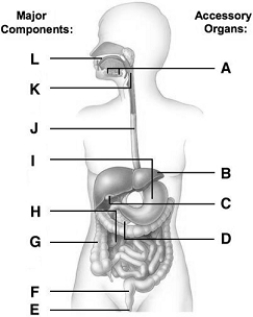
Continued exposure to carbon monoxide can cause
A) coma.
B) cardiac arrest.
C) seizures.
D) death.
E) all of these
E
3

Which of the following is not true of carbon monoxide?
A) it is a gas.
B) it is in automobile exhaust.
C) it is harmless.
D) it is odorless.
E) it is in cigarette smoke.
C
4
What is the proper sequence in the flow of air in mammals?
A) nasal cavities, larynx, pharynx, bronchi, trachea
B) nasal cavities, pharynx, bronchi, larynx, trachea
C) nasal cavities, pharynx, larynx, trachea, bronchi
D) nasal cavities, larynx, pharynx, trachea, bronchi
E) nasal cavities, bronchi, larynx, trachea, pharynx
A) nasal cavities, larynx, pharynx, bronchi, trachea
B) nasal cavities, pharynx, bronchi, larynx, trachea
C) nasal cavities, pharynx, larynx, trachea, bronchi
D) nasal cavities, larynx, pharynx, trachea, bronchi
E) nasal cavities, bronchi, larynx, trachea, pharynx

Unlock Deck
Unlock for access to all 78 flashcards in this deck.
Unlock Deck
k this deck
5
Humans produce sounds by controlling the vibration of vocal cords as air passes through the
A) pharynx.
B) glottis.
C) epiglottis.
D) pleura.
E) trachea.
A) pharynx.
B) glottis.
C) epiglottis.
D) pleura.
E) trachea.

Unlock Deck
Unlock for access to all 78 flashcards in this deck.
Unlock Deck
k this deck
6

In the respiration of terrestrial animals, "ventilation" refers to
A) the bulk movement of air in and out of the organism.
B) the diffusion of gases across a membrane.
C) the diffusion of gases in and out of blood cells.
D) the transport of gases to and from body cells.
E) all of these.

Unlock Deck
Unlock for access to all 78 flashcards in this deck.
Unlock Deck
k this deck
7
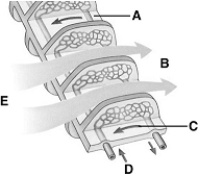 The following questions refer to the figure above showing a fish gill filament.
The following questions refer to the figure above showing a fish gill filament.Which of the following is(are) characteristic of some amphibians?
A) gills
B) exchange of some gases occurs across their skin.
C) lungs for oxygen uptake
D) skin for carbon dioxide removal
E) all of these

Unlock Deck
Unlock for access to all 78 flashcards in this deck.
Unlock Deck
k this deck
8
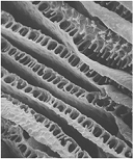
Countercurrent flow in the respiratory systems of fish is a mechanism that accounts for
A) oxygen uptake by blood capillaries in the gills.
B) ventilation across fish gills.
C) the transport of blood from the gills to the fish's heart.
D) the transport of blood from the heart to the fish's main body mass.
E) the flow of blood in gills as opposed to the flow of blood in the main body mass of fish.

Unlock Deck
Unlock for access to all 78 flashcards in this deck.
Unlock Deck
k this deck
9

The movement of both oxygen and carbon dioxide in the body is accomplished by
A) exocytosis and endocytosis.
B) facilitated diffusion.
C) osmosis.
D) simple diffusion.
E) active transport.

Unlock Deck
Unlock for access to all 78 flashcards in this deck.
Unlock Deck
k this deck
10
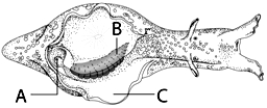
The letter B" in the above figure represents its
A) shell.
B) mantle.
C) gills.
D) siphon.
E) none of these.

Unlock Deck
Unlock for access to all 78 flashcards in this deck.
Unlock Deck
k this deck
11

Which of the following is true regarding insect tracheal systems?
A) They are associated with the blood circulatory system.
B) They excrete body wastes as well as transport gases.
C) They depend on the opening and closing of spiracles.
D) The tracheal tubes are continually open in large terrestrial insects.
E) They contain respiratory pigments to enhance oxygen transport.

Unlock Deck
Unlock for access to all 78 flashcards in this deck.
Unlock Deck
k this deck
12
Air is continuously forced through tubes that thread through vascularized tissue in a pair of inelastic lungs in
A) some fish.
B) amphibians.
C) birds.
D) reptiles.
E) some small mammals.
A) some fish.
B) amphibians.
C) birds.
D) reptiles.
E) some small mammals.

Unlock Deck
Unlock for access to all 78 flashcards in this deck.
Unlock Deck
k this deck
13

The figure listed above is known as
A) a book lung.
B) a tracheal system.
C) gills.
D) a lung micrograph.
E) none of these.

Unlock Deck
Unlock for access to all 78 flashcards in this deck.
Unlock Deck
k this deck
14

Which of the following is false regarding hemoglobin?
A) It is a protein.
B) It contains iron.
C) It has the same function in mollusks, annelids, and some crustaceans as it has in humans.
D) Clams, like humans, carry hemoglobin in red blood cells.
E) It is comparable in function to hemocyanin.

Unlock Deck
Unlock for access to all 78 flashcards in this deck.
Unlock Deck
k this deck
15
The exchange of gases in the human lungs occurs through the
A) bronchi.
B) alveoli.
C) bronchioles.
D) tracheas.
E) glottis.
A) bronchi.
B) alveoli.
C) bronchioles.
D) tracheas.
E) glottis.

Unlock Deck
Unlock for access to all 78 flashcards in this deck.
Unlock Deck
k this deck
16
 The following questions refer to the figure above showing a fish gill filament.
The following questions refer to the figure above showing a fish gill filament.The least oxygenated water is indicated by
A) A.
B) B.
C) C.
D) D.
E) E.

Unlock Deck
Unlock for access to all 78 flashcards in this deck.
Unlock Deck
k this deck
17
 The following questions refer to the figure above showing a fish gill filament.
The following questions refer to the figure above showing a fish gill filament.A respiratory surface is indicated by
A) A.
B) B.
C) C.
D) D.
E) E.

Unlock Deck
Unlock for access to all 78 flashcards in this deck.
Unlock Deck
k this deck
18
The last structure that air moves through in mammals before entering the alveoli is(are) the
A) larynx.
B) bronchi.
C) bronchioles.
D) trachea.
E) pharynx.
A) larynx.
B) bronchi.
C) bronchioles.
D) trachea.
E) pharynx.

Unlock Deck
Unlock for access to all 78 flashcards in this deck.
Unlock Deck
k this deck
19
The ____ prevents food and fluids from entering the ____.
A) epiglottis; larynx
B) pharynx; larynx
C) epiglottis; esophagus
D) pharynx; trachea
E) larynx; pharynx
A) epiglottis; larynx
B) pharynx; larynx
C) epiglottis; esophagus
D) pharynx; trachea
E) larynx; pharynx

Unlock Deck
Unlock for access to all 78 flashcards in this deck.
Unlock Deck
k this deck
20
 The following questions refer to the figure above showing a fish gill filament.
The following questions refer to the figure above showing a fish gill filament.Paired lungs are characteristic of
A) some fishes.
B) all amphibians.
C) all birds.
D) all mammals.
E) all of these.

Unlock Deck
Unlock for access to all 78 flashcards in this deck.
Unlock Deck
k this deck
21
The vital capacity is indicated by
A) A + D.
B) A + D + E.
C) C + E.
D) A + B + C + D.
E) A + C + D.
A) A + D.
B) A + D + E.
C) C + E.
D) A + B + C + D.
E) A + C + D.

Unlock Deck
Unlock for access to all 78 flashcards in this deck.
Unlock Deck
k this deck
22
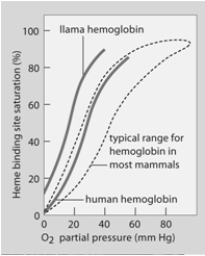
At what partial pressure of oxygen do half the heme groups in human blood have oxygen bound?
A) 30 mm Hg
B) 100 mm Hg
C) 70 mm Hg
D) 104 mm Hg
E) all of these

Unlock Deck
Unlock for access to all 78 flashcards in this deck.
Unlock Deck
k this deck
23
Globally, cigarette smoking kills four million people annually.That number is expected to increase to ____ million by 2030.
A) 10
B) 50
C) 100
D) 150
E) 250
A) 10
B) 50
C) 100
D) 150
E) 250

Unlock Deck
Unlock for access to all 78 flashcards in this deck.
Unlock Deck
k this deck
24
MATCHING
Matching.Choose the one most appropriate answer for each.
a.flexible windpipe reinforced with cartilage
b.surrounds each lung
c.oxygen-rich form of a respiratory protein
d.contains two true vocal cords
e.alter chest cavity volume
f.part of the brainstem; controls breathing
g.throat passage behind the mouth
h.inhalation and exhalation
i.connect trachea to lungs
j.
flaplike structure that points upward allowing air to enter trachea, but blocks the larynx during swallowing
k.contraction increases thoracic volume
l.
microscopically small pockets lined with moist epithelium
diaphragm
Matching.Choose the one most appropriate answer for each.
a.flexible windpipe reinforced with cartilage
b.surrounds each lung
c.oxygen-rich form of a respiratory protein
d.contains two true vocal cords
e.alter chest cavity volume
f.part of the brainstem; controls breathing
g.throat passage behind the mouth
h.inhalation and exhalation
i.connect trachea to lungs
j.
flaplike structure that points upward allowing air to enter trachea, but blocks the larynx during swallowing
k.contraction increases thoracic volume
l.
microscopically small pockets lined with moist epithelium
diaphragm

Unlock Deck
Unlock for access to all 78 flashcards in this deck.
Unlock Deck
k this deck
25
Most of the carbon dioxide produced by the body is transported to the lungs
A) in gaseous form.
B) in blood plasma.
C) as carbaminohemoglobin.
D) as bicarbonate ions.
E) as carbonic acid.
A) in gaseous form.
B) in blood plasma.
C) as carbaminohemoglobin.
D) as bicarbonate ions.
E) as carbonic acid.

Unlock Deck
Unlock for access to all 78 flashcards in this deck.
Unlock Deck
k this deck
26
Deep-diving animals accomplish their dives through all of the following means EXCEPT by
A) redirecting blood flow.
B) conserving energy by gliding rather than swimming.
C) relying primarily on anaerobic respiration during deep dives.
D) binding oxygen to myoglobin and hemoglobin.
E) assuring that the brain has an uninterrupted supply of ATP.
A) redirecting blood flow.
B) conserving energy by gliding rather than swimming.
C) relying primarily on anaerobic respiration during deep dives.
D) binding oxygen to myoglobin and hemoglobin.
E) assuring that the brain has an uninterrupted supply of ATP.

Unlock Deck
Unlock for access to all 78 flashcards in this deck.
Unlock Deck
k this deck
27
____ is always ____, while ____ may be ____.
A) Exhalation; passive; inhalation; active
B) Inhalation; active; exhalation; passive
C) Inhalation; passive; exhalation; active
D) Exhalation; active; inhalation; passive
E) Exhalation; active; inhalation; active
A) Exhalation; passive; inhalation; active
B) Inhalation; active; exhalation; passive
C) Inhalation; passive; exhalation; active
D) Exhalation; active; inhalation; passive
E) Exhalation; active; inhalation; active

Unlock Deck
Unlock for access to all 78 flashcards in this deck.
Unlock Deck
k this deck
28
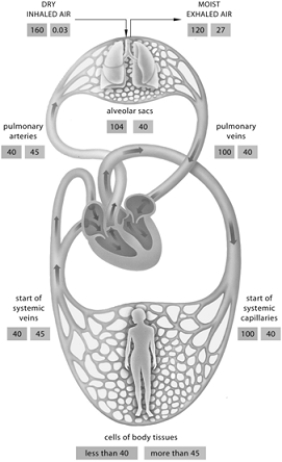 Use the figure above to answer the following questions.
Use the figure above to answer the following questions.What is the partial pressure of oxygen at the start of the systemic capillary beds?
A) 40 mm Hg
B) 100 mm Hg
C) 70 mm Hg
D) 104 mm Hg
E) all of these

Unlock Deck
Unlock for access to all 78 flashcards in this deck.
Unlock Deck
k this deck
29
MATCHING
Matching.Choose the one most appropriate answer for each.
a.flexible windpipe reinforced with cartilage
b.surrounds each lung
c.oxygen-rich form of a respiratory protein
d.contains two true vocal cords
e.alter chest cavity volume
f.part of the brainstem; controls breathing
g.throat passage behind the mouth
h.inhalation and exhalation
i.connect trachea to lungs
j.
flaplike structure that points upward allowing air to enter trachea, but blocks the larynx during swallowing
k.contraction increases thoracic volume
l.
microscopically small pockets lined with moist epithelium
bronchi
Matching.Choose the one most appropriate answer for each.
a.flexible windpipe reinforced with cartilage
b.surrounds each lung
c.oxygen-rich form of a respiratory protein
d.contains two true vocal cords
e.alter chest cavity volume
f.part of the brainstem; controls breathing
g.throat passage behind the mouth
h.inhalation and exhalation
i.connect trachea to lungs
j.
flaplike structure that points upward allowing air to enter trachea, but blocks the larynx during swallowing
k.contraction increases thoracic volume
l.
microscopically small pockets lined with moist epithelium
bronchi

Unlock Deck
Unlock for access to all 78 flashcards in this deck.
Unlock Deck
k this deck
30
Altitude sickness
A) results from hypoxia.
B) is characterized by hyperventilation.
C) is characterized by nausea.
D) is characterized by an accelerated heart rate.
E) includes all of these.
A) results from hypoxia.
B) is characterized by hyperventilation.
C) is characterized by nausea.
D) is characterized by an accelerated heart rate.
E) includes all of these.

Unlock Deck
Unlock for access to all 78 flashcards in this deck.
Unlock Deck
k this deck
31
MATCHING
Matching.Choose the one most appropriate answer for each.
a.flexible windpipe reinforced with cartilage
b.surrounds each lung
c.oxygen-rich form of a respiratory protein
d.contains two true vocal cords
e.alter chest cavity volume
f.part of the brainstem; controls breathing
g.throat passage behind the mouth
h.inhalation and exhalation
i.connect trachea to lungs
j.
flaplike structure that points upward allowing air to enter trachea, but blocks the larynx during swallowing
k.contraction increases thoracic volume
l.
microscopically small pockets lined with moist epithelium
epiglottis
Matching.Choose the one most appropriate answer for each.
a.flexible windpipe reinforced with cartilage
b.surrounds each lung
c.oxygen-rich form of a respiratory protein
d.contains two true vocal cords
e.alter chest cavity volume
f.part of the brainstem; controls breathing
g.throat passage behind the mouth
h.inhalation and exhalation
i.connect trachea to lungs
j.
flaplike structure that points upward allowing air to enter trachea, but blocks the larynx during swallowing
k.contraction increases thoracic volume
l.
microscopically small pockets lined with moist epithelium
epiglottis

Unlock Deck
Unlock for access to all 78 flashcards in this deck.
Unlock Deck
k this deck
32
Cancer(s) of which of the following is(are) associated with chronic smoking?
A) larynx
B) esophagus
C) pancreas
D) bladder
E) all of these
A) larynx
B) esophagus
C) pancreas
D) bladder
E) all of these

Unlock Deck
Unlock for access to all 78 flashcards in this deck.
Unlock Deck
k this deck
33
Which of the following is a common cause of interrupted breathing?
A) sleep apnea
B) lung cancer
C) high altitude sickness
D) low red blood cell count
E) none of these
A) sleep apnea
B) lung cancer
C) high altitude sickness
D) low red blood cell count
E) none of these

Unlock Deck
Unlock for access to all 78 flashcards in this deck.
Unlock Deck
k this deck
34
MATCHING
Matching.Choose the one most appropriate answer for each.
a.flexible windpipe reinforced with cartilage
b.surrounds each lung
c.oxygen-rich form of a respiratory protein
d.contains two true vocal cords
e.alter chest cavity volume
f.part of the brainstem; controls breathing
g.throat passage behind the mouth
h.inhalation and exhalation
i.connect trachea to lungs
j.
flaplike structure that points upward allowing air to enter trachea, but blocks the larynx during swallowing
k.contraction increases thoracic volume
l.
microscopically small pockets lined with moist epithelium
alveoli
Matching.Choose the one most appropriate answer for each.
a.flexible windpipe reinforced with cartilage
b.surrounds each lung
c.oxygen-rich form of a respiratory protein
d.contains two true vocal cords
e.alter chest cavity volume
f.part of the brainstem; controls breathing
g.throat passage behind the mouth
h.inhalation and exhalation
i.connect trachea to lungs
j.
flaplike structure that points upward allowing air to enter trachea, but blocks the larynx during swallowing
k.contraction increases thoracic volume
l.
microscopically small pockets lined with moist epithelium
alveoli

Unlock Deck
Unlock for access to all 78 flashcards in this deck.
Unlock Deck
k this deck
35
Oxygen moves from alveoli to the bloodstream
A) because the concentration of oxygen is greater in alveoli than in the blood.
B) mainly due to the activity of carbonic anhydrase in the red blood cells.
C) because of its attraction to hemoglobin.
D) to counter the high concentration of CO2 in the blood.
E) because of all of these.
A) because the concentration of oxygen is greater in alveoli than in the blood.
B) mainly due to the activity of carbonic anhydrase in the red blood cells.
C) because of its attraction to hemoglobin.
D) to counter the high concentration of CO2 in the blood.
E) because of all of these.

Unlock Deck
Unlock for access to all 78 flashcards in this deck.
Unlock Deck
k this deck
36
Oxyhemoglobin tends to give up oxygen where
A) the pH is low.
B) the tissues are warmer.
C) the partial pressure of O2 is low.
D) the partial pressure of CO2 is high.
E) all of these occur.
A) the pH is low.
B) the tissues are warmer.
C) the partial pressure of O2 is low.
D) the partial pressure of CO2 is high.
E) all of these occur.

Unlock Deck
Unlock for access to all 78 flashcards in this deck.
Unlock Deck
k this deck
37
Which of the following is a cause of apnea?
A) a tumor in the brain near the medulla oblongata
B) lung cancer
C) high altitude sickness
D) low red blood cell count
E) none of these
A) a tumor in the brain near the medulla oblongata
B) lung cancer
C) high altitude sickness
D) low red blood cell count
E) none of these

Unlock Deck
Unlock for access to all 78 flashcards in this deck.
Unlock Deck
k this deck
38
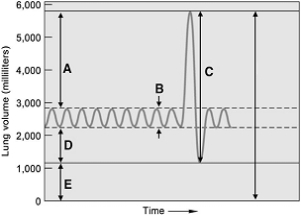 The following questions refer to the figure above.
The following questions refer to the figure above.Ventilation by an individual exercising strenuously is indicated by
A) A.
B) B.
C) C.
D) D.
E) E.

Unlock Deck
Unlock for access to all 78 flashcards in this deck.
Unlock Deck
k this deck
39
 The following questions refer to the figure above.
The following questions refer to the figure above.Ventilation by a relaxed individual is indicated by
A) A.
B) B.
C) C.
D) D.
E) E.

Unlock Deck
Unlock for access to all 78 flashcards in this deck.
Unlock Deck
k this deck
40
"Rapture of the deep" is caused by excessive ____ in the interstitial fluid.
A) O2
B) H2O
C) CO2
D) CO
E) N2
A) O2
B) H2O
C) CO2
D) CO
E) N2

Unlock Deck
Unlock for access to all 78 flashcards in this deck.
Unlock Deck
k this deck
41
MATCHING
Matching.Choose the one most appropriate answer for each.
a.flexible windpipe reinforced with cartilage
b.surrounds each lung
c.oxygen-rich form of a respiratory protein
d.contains two true vocal cords
e.alter chest cavity volume
f.part of the brainstem; controls breathing
g.throat passage behind the mouth
h.inhalation and exhalation
i.connect trachea to lungs
j.
flaplike structure that points upward allowing air to enter trachea, but blocks the larynx during swallowing
k.contraction increases thoracic volume
l.
microscopically small pockets lined with moist epithelium
medulla oblongata
Matching.Choose the one most appropriate answer for each.
a.flexible windpipe reinforced with cartilage
b.surrounds each lung
c.oxygen-rich form of a respiratory protein
d.contains two true vocal cords
e.alter chest cavity volume
f.part of the brainstem; controls breathing
g.throat passage behind the mouth
h.inhalation and exhalation
i.connect trachea to lungs
j.
flaplike structure that points upward allowing air to enter trachea, but blocks the larynx during swallowing
k.contraction increases thoracic volume
l.
microscopically small pockets lined with moist epithelium
medulla oblongata

Unlock Deck
Unlock for access to all 78 flashcards in this deck.
Unlock Deck
k this deck
42
MATCHING
Matching.Choose the one most appropriate answer for each.
a.flexible windpipe reinforced with cartilage
b.surrounds each lung
c.oxygen-rich form of a respiratory protein
d.contains two true vocal cords
e.alter chest cavity volume
f.part of the brainstem; controls breathing
g.throat passage behind the mouth
h.inhalation and exhalation
i.connect trachea to lungs
j.
flaplike structure that points upward allowing air to enter trachea, but blocks the larynx during swallowing
k.contraction increases thoracic volume
l.
microscopically small pockets lined with moist epithelium
ventilation
Matching.Choose the one most appropriate answer for each.
a.flexible windpipe reinforced with cartilage
b.surrounds each lung
c.oxygen-rich form of a respiratory protein
d.contains two true vocal cords
e.alter chest cavity volume
f.part of the brainstem; controls breathing
g.throat passage behind the mouth
h.inhalation and exhalation
i.connect trachea to lungs
j.
flaplike structure that points upward allowing air to enter trachea, but blocks the larynx during swallowing
k.contraction increases thoracic volume
l.
microscopically small pockets lined with moist epithelium
ventilation

Unlock Deck
Unlock for access to all 78 flashcards in this deck.
Unlock Deck
k this deck
43
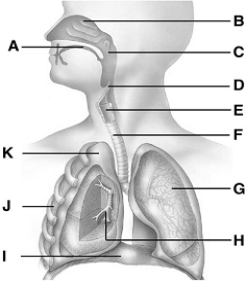
lung

Unlock Deck
Unlock for access to all 78 flashcards in this deck.
Unlock Deck
k this deck
44
Classification.Respond to the following statements with reference to the five components of respiratory systems listed below.
a.pharynx
b.larynx
c.trachea
d.bronchiole
e.alveolus
Air moves from the nasal cavity into this passageway.
a.pharynx
b.larynx
c.trachea
d.bronchiole
e.alveolus
Air moves from the nasal cavity into this passageway.

Unlock Deck
Unlock for access to all 78 flashcards in this deck.
Unlock Deck
k this deck
45
Classification.Respond to the following statements with reference to the five components of respiratory systems listed below.
a.pharynx
b.larynx
c.trachea
d.bronchiole
e.alveolus
This is the last component of the human lung that air flows into.
a.pharynx
b.larynx
c.trachea
d.bronchiole
e.alveolus
This is the last component of the human lung that air flows into.

Unlock Deck
Unlock for access to all 78 flashcards in this deck.
Unlock Deck
k this deck
46

intercostal muscles

Unlock Deck
Unlock for access to all 78 flashcards in this deck.
Unlock Deck
k this deck
47
MATCHING
Matching.Choose the one most appropriate answer for each.
a.flexible windpipe reinforced with cartilage
b.surrounds each lung
c.oxygen-rich form of a respiratory protein
d.contains two true vocal cords
e.alter chest cavity volume
f.part of the brainstem; controls breathing
g.throat passage behind the mouth
h.inhalation and exhalation
i.connect trachea to lungs
j.
flaplike structure that points upward allowing air to enter trachea, but blocks the larynx during swallowing
k.contraction increases thoracic volume
l.
microscopically small pockets lined with moist epithelium
pharynx
Matching.Choose the one most appropriate answer for each.
a.flexible windpipe reinforced with cartilage
b.surrounds each lung
c.oxygen-rich form of a respiratory protein
d.contains two true vocal cords
e.alter chest cavity volume
f.part of the brainstem; controls breathing
g.throat passage behind the mouth
h.inhalation and exhalation
i.connect trachea to lungs
j.
flaplike structure that points upward allowing air to enter trachea, but blocks the larynx during swallowing
k.contraction increases thoracic volume
l.
microscopically small pockets lined with moist epithelium
pharynx

Unlock Deck
Unlock for access to all 78 flashcards in this deck.
Unlock Deck
k this deck
48

nasal cavity

Unlock Deck
Unlock for access to all 78 flashcards in this deck.
Unlock Deck
k this deck
49
Classification.Respond to the following statements with reference to the five components of respiratory systems listed below.
a.pharynx
b.larynx
c.trachea
d.bronchiole
e.alveolus
Gas exchange between the air in the lungs and the blood circulatory system occurs here.
a.pharynx
b.larynx
c.trachea
d.bronchiole
e.alveolus
Gas exchange between the air in the lungs and the blood circulatory system occurs here.

Unlock Deck
Unlock for access to all 78 flashcards in this deck.
Unlock Deck
k this deck
50

larynx

Unlock Deck
Unlock for access to all 78 flashcards in this deck.
Unlock Deck
k this deck
51

bronchial tree

Unlock Deck
Unlock for access to all 78 flashcards in this deck.
Unlock Deck
k this deck
52
MATCHING
Matching.Choose the one most appropriate answer for each.
a.flexible windpipe reinforced with cartilage
b.surrounds each lung
c.oxygen-rich form of a respiratory protein
d.contains two true vocal cords
e.alter chest cavity volume
f.part of the brainstem; controls breathing
g.throat passage behind the mouth
h.inhalation and exhalation
i.connect trachea to lungs
j.
flaplike structure that points upward allowing air to enter trachea, but blocks the larynx during swallowing
k.contraction increases thoracic volume
l.
microscopically small pockets lined with moist epithelium
oxyhemoglobin
Matching.Choose the one most appropriate answer for each.
a.flexible windpipe reinforced with cartilage
b.surrounds each lung
c.oxygen-rich form of a respiratory protein
d.contains two true vocal cords
e.alter chest cavity volume
f.part of the brainstem; controls breathing
g.throat passage behind the mouth
h.inhalation and exhalation
i.connect trachea to lungs
j.
flaplike structure that points upward allowing air to enter trachea, but blocks the larynx during swallowing
k.contraction increases thoracic volume
l.
microscopically small pockets lined with moist epithelium
oxyhemoglobin

Unlock Deck
Unlock for access to all 78 flashcards in this deck.
Unlock Deck
k this deck
53
Classification.Respond to the following statements with reference to the five components of respiratory systems listed below.
a.pharynx
b.larynx
c.trachea
d.bronchiole
e.alveolus
Spent air moves from the bronchial tubes to this component.
a.pharynx
b.larynx
c.trachea
d.bronchiole
e.alveolus
Spent air moves from the bronchial tubes to this component.

Unlock Deck
Unlock for access to all 78 flashcards in this deck.
Unlock Deck
k this deck
54
Classification.Respond to the following statements with reference to the five components of respiratory systems listed below.
a.pharynx
b.larynx
c.trachea
d.bronchiole
e.alveolus
The voice box is located here.
a.pharynx
b.larynx
c.trachea
d.bronchiole
e.alveolus
The voice box is located here.

Unlock Deck
Unlock for access to all 78 flashcards in this deck.
Unlock Deck
k this deck
55

diaphragm

Unlock Deck
Unlock for access to all 78 flashcards in this deck.
Unlock Deck
k this deck
56
MATCHING
Matching.Choose the one most appropriate answer for each.
a.flexible windpipe reinforced with cartilage
b.surrounds each lung
c.oxygen-rich form of a respiratory protein
d.contains two true vocal cords
e.alter chest cavity volume
f.part of the brainstem; controls breathing
g.throat passage behind the mouth
h.inhalation and exhalation
i.connect trachea to lungs
j.
flaplike structure that points upward allowing air to enter trachea, but blocks the larynx during swallowing
k.contraction increases thoracic volume
l.
microscopically small pockets lined with moist epithelium
larynx
Matching.Choose the one most appropriate answer for each.
a.flexible windpipe reinforced with cartilage
b.surrounds each lung
c.oxygen-rich form of a respiratory protein
d.contains two true vocal cords
e.alter chest cavity volume
f.part of the brainstem; controls breathing
g.throat passage behind the mouth
h.inhalation and exhalation
i.connect trachea to lungs
j.
flaplike structure that points upward allowing air to enter trachea, but blocks the larynx during swallowing
k.contraction increases thoracic volume
l.
microscopically small pockets lined with moist epithelium
larynx

Unlock Deck
Unlock for access to all 78 flashcards in this deck.
Unlock Deck
k this deck
57
MATCHING
Matching.Choose the one most appropriate answer for each.
a.flexible windpipe reinforced with cartilage
b.surrounds each lung
c.oxygen-rich form of a respiratory protein
d.contains two true vocal cords
e.alter chest cavity volume
f.part of the brainstem; controls breathing
g.throat passage behind the mouth
h.inhalation and exhalation
i.connect trachea to lungs
j.
flaplike structure that points upward allowing air to enter trachea, but blocks the larynx during swallowing
k.contraction increases thoracic volume
l.
microscopically small pockets lined with moist epithelium
trachea
Matching.Choose the one most appropriate answer for each.
a.flexible windpipe reinforced with cartilage
b.surrounds each lung
c.oxygen-rich form of a respiratory protein
d.contains two true vocal cords
e.alter chest cavity volume
f.part of the brainstem; controls breathing
g.throat passage behind the mouth
h.inhalation and exhalation
i.connect trachea to lungs
j.
flaplike structure that points upward allowing air to enter trachea, but blocks the larynx during swallowing
k.contraction increases thoracic volume
l.
microscopically small pockets lined with moist epithelium
trachea

Unlock Deck
Unlock for access to all 78 flashcards in this deck.
Unlock Deck
k this deck
58
MATCHING
Matching.Choose the one most appropriate answer for each.
a.flexible windpipe reinforced with cartilage
b.surrounds each lung
c.oxygen-rich form of a respiratory protein
d.contains two true vocal cords
e.alter chest cavity volume
f.part of the brainstem; controls breathing
g.throat passage behind the mouth
h.inhalation and exhalation
i.connect trachea to lungs
j.
flaplike structure that points upward allowing air to enter trachea, but blocks the larynx during swallowing
k.contraction increases thoracic volume
l.
microscopically small pockets lined with moist epithelium
pleural sac
Matching.Choose the one most appropriate answer for each.
a.flexible windpipe reinforced with cartilage
b.surrounds each lung
c.oxygen-rich form of a respiratory protein
d.contains two true vocal cords
e.alter chest cavity volume
f.part of the brainstem; controls breathing
g.throat passage behind the mouth
h.inhalation and exhalation
i.connect trachea to lungs
j.
flaplike structure that points upward allowing air to enter trachea, but blocks the larynx during swallowing
k.contraction increases thoracic volume
l.
microscopically small pockets lined with moist epithelium
pleural sac

Unlock Deck
Unlock for access to all 78 flashcards in this deck.
Unlock Deck
k this deck
59
MATCHING
Matching.Choose the one most appropriate answer for each.
a.flexible windpipe reinforced with cartilage
b.surrounds each lung
c.oxygen-rich form of a respiratory protein
d.contains two true vocal cords
e.alter chest cavity volume
f.part of the brainstem; controls breathing
g.throat passage behind the mouth
h.inhalation and exhalation
i.connect trachea to lungs
j.
flaplike structure that points upward allowing air to enter trachea, but blocks the larynx during swallowing
k.contraction increases thoracic volume
l.
microscopically small pockets lined with moist epithelium
rib muscles
Matching.Choose the one most appropriate answer for each.
a.flexible windpipe reinforced with cartilage
b.surrounds each lung
c.oxygen-rich form of a respiratory protein
d.contains two true vocal cords
e.alter chest cavity volume
f.part of the brainstem; controls breathing
g.throat passage behind the mouth
h.inhalation and exhalation
i.connect trachea to lungs
j.
flaplike structure that points upward allowing air to enter trachea, but blocks the larynx during swallowing
k.contraction increases thoracic volume
l.
microscopically small pockets lined with moist epithelium
rib muscles

Unlock Deck
Unlock for access to all 78 flashcards in this deck.
Unlock Deck
k this deck
60

pleural membrane

Unlock Deck
Unlock for access to all 78 flashcards in this deck.
Unlock Deck
k this deck
61

trachea

Unlock Deck
Unlock for access to all 78 flashcards in this deck.
Unlock Deck
k this deck
62
Why would athletes in aerobic sports benefit by training at high altitude?

Unlock Deck
Unlock for access to all 78 flashcards in this deck.
Unlock Deck
k this deck
63
Water flowing over fish gills exchanges gases with blood flowing in the opposite direction inside gill capillaries.This is called__________.

Unlock Deck
Unlock for access to all 78 flashcards in this deck.
Unlock Deck
k this deck
64
A flap of tissue called the __________ directs air through the __________, the opening to the __________ (windpipe).

Unlock Deck
Unlock for access to all 78 flashcards in this deck.
Unlock Deck
k this deck
65
Which of the following have the most efficient lungs: amphibians, mammals or birds? Explain your answer.

Unlock Deck
Unlock for access to all 78 flashcards in this deck.
Unlock Deck
k this deck
66
Most CO2 reacts with water inside red blood cells to form bicarbonate, due to the activity of __________.

Unlock Deck
Unlock for access to all 78 flashcards in this deck.
Unlock Deck
k this deck
67
__________ is normally far less than __________.

Unlock Deck
Unlock for access to all 78 flashcards in this deck.
Unlock Deck
k this deck
68
Respiratory proteins such as __________ in red blood cells and __________ in muscle bind oxygen and help maintain gradients that favor gas exchange.

Unlock Deck
Unlock for access to all 78 flashcards in this deck.
Unlock Deck
k this deck
69
Chart the path of air from the atmosphere to the blood.

Unlock Deck
Unlock for access to all 78 flashcards in this deck.
Unlock Deck
k this deck
70

oral cavity

Unlock Deck
Unlock for access to all 78 flashcards in this deck.
Unlock Deck
k this deck
71

pharynx

Unlock Deck
Unlock for access to all 78 flashcards in this deck.
Unlock Deck
k this deck
72
Invertebrates on land use __________ or __________ systems for gas exchange.

Unlock Deck
Unlock for access to all 78 flashcards in this deck.
Unlock Deck
k this deck
73
Respiration is a physiological process by which O2 enters the internal environment and CO2 leaves by diffusing across a __________.

Unlock Deck
Unlock for access to all 78 flashcards in this deck.
Unlock Deck
k this deck
74
If a person is choking, the __________ maneuver can be used to expel food from their trachea.

Unlock Deck
Unlock for access to all 78 flashcards in this deck.
Unlock Deck
k this deck
75
Contractions of the dome-shaped __________ and the intercostal muscles between the ribs alter the volume of the thoracic cavity during breathing.

Unlock Deck
Unlock for access to all 78 flashcards in this deck.
Unlock Deck
k this deck
76
Which respiratory volume would emphysema have the greatest impact on?

Unlock Deck
Unlock for access to all 78 flashcards in this deck.
Unlock Deck
k this deck
77

epiglottis

Unlock Deck
Unlock for access to all 78 flashcards in this deck.
Unlock Deck
k this deck
78
Some invertebrates do not have special respiratory organs and rely on __________ exchange, diffusion of gases across the body surface.

Unlock Deck
Unlock for access to all 78 flashcards in this deck.
Unlock Deck
k this deck


